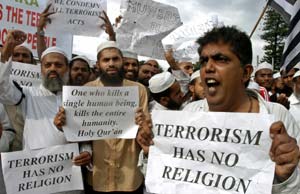MORE THAN 200 DEAD BY BOMBS LEFT IN LUGGAGE RACKS

Within the space of ten minutes during Mumbai's rush hour, at least seven bombs detonated inside the first class carriages of commuter trains, killing more than 200 people and flooding hospitals with almost 1000 injured.
No terrorist group has yet claimed responsibility, though Islamist militants warring over the disputed India-Pakistan territory of Kashmir are being fingered as the bombers. There are plenty of theories, but not yet much proof :
Local papers said police were probing links between the Students' Islamic Movement of India and Lashkar-e-Taiba, or Army of the Pious.
Two leading militant outfits denied involvement.
Lashkar spokesman Abdullah Ghaznavi told АFР that his group was not involved and in Pakistan Hizbul Mujahedin, a leading umbrella group of guerrilla outfits, issued a similar denial.
But Bharat Karnad, analyst at the New Delhi-based Centre for Policy Research, said: "It's fairly certain this is the result of the Lashkar-e-Taiba and some other jihadist (holy warrior) groups."
Terror strikes like these are obviously aimed at causing mass fear and maximum disruption, but these comments from one local businessman show just how quickly a city can recover from a massive terrorist attack :
"Terrorists can do anything they like," 52-year-old businessman Dilip Khadaria said. "We are businessmen, we will be going back to work. It won't hamper our business, it won't stop our work."Many Mumbai businesses reported a 100% turn up rate for workers only 12 to 14 hours after the attacks. In fact, the attendance rate was higher than an average work day for hundreds of businesses, as workers went to work to show solidarity and that they were not afraid.
Extraordinary.
And this :
The way Mumbai came back to life after the initial shock within the first few hours has etched a valiant picture in the minds of thousands in and outside the city.If the idea was to cripple the community, the terror attacks do not appear to have worked.
"One thing is very clear. Whenever the city faces any calamity it is the courage of the common man that comes to the fore,' said ace Bollywood film director Rakesh Roshan.
"It is the unity of the citizens that deters the evil designs of our enemies..."
Pakistan and India have fought three major wars since the end of World War 2 and have made solid moves towards total peace and further understanding since 2004. Even the disputed territory of Kashmir has been opened to visitors from both sides in something of a symbolic, if not historic, attempt at reconciliation. But the tensions between the two nuclear armed neighbours remain :
India reacted angrily on Wednesday to comments by Pakistani Foreign Minister Khursheed Mehmood Kasuri that sought to link the Mumbai bomb blasts with outstanding disputes between the two countries.But despite the tensions, India said it will not allow the terrorist attacks to disrupt the ongoing peace between the two countries.
“We find it appalling that Foreign Minister Kasuri should seek to link this blatant and inhuman act of terror against men, women and children to the so-called lack of resolution of disputes between India and Pakistan,” External Affairs Ministry spokesman Navtej Sarna told a news conference.
“Anything done to disturb peace should be stopped. It is our responsibility to see that such activities are put to an end,”
India’s home minister Shivraj Patil told a news conference in New Delhi.
The bombings were meant to upset the peace process, a top home ministry official told the press conference.
“It will take time to take on forces trying to derail the ongoing peace process,” said home secretary V.K. Duggal. “The confidence-building measures (between India and Pakistan) will continue. The peace process will not be slowed down.”
The attacks came only days after India test-fired a missile capable of carrying a nuclear warhead thousands of kilometres.
US Secretary of State, Condileeza Rice, was pressuring Congress only hours before the terror attacks to move fast to allow an exchange of civilian nuclear energy technology between the US and India.
Rice noted in a speech to a group of Indian-Americans that legislation on the pact that President George W. Bush considers one of his premier foreign policy efforts was overwhelmingly endorsed by two key congressional panels last month. But,
Rice said, “Our work is not yet done.”
India, like its neighbour Pakistan, is armed with nuclear weapons.
India's City Of Dreamers Hit By Nightmare Of Horrors - Victims Tell Their Stories